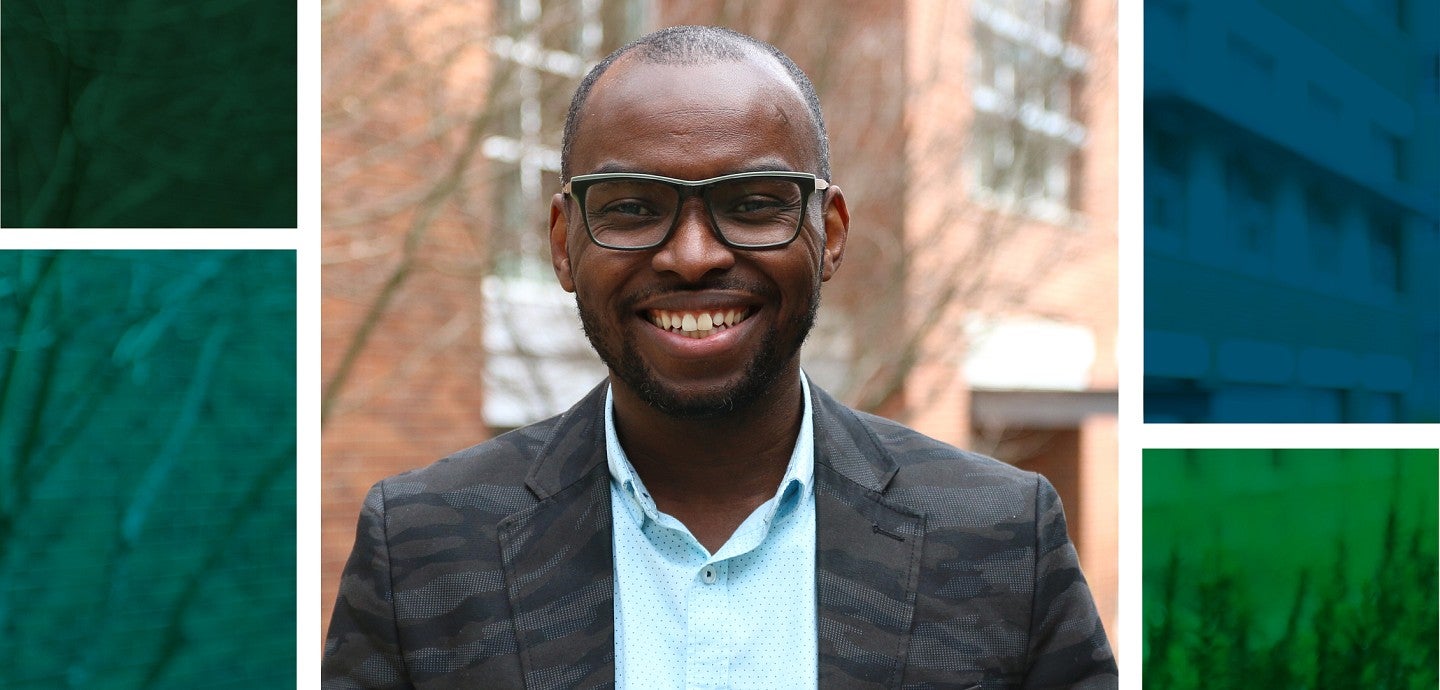
Senyo Ofori-Parku stands outside Allen Hall at the University of Oregon.
Senyo Ofori-Parku pierces the mental fog hanging over his Monday morning class with a familiar prompt: “Let’s recap last week.” His two dozen students perk up but stay silent. “Remember effective frequency?,” he encourages. “Things don’t register the first time; that’s why we do this.” He glances from student to student, smiling, and says, “talk to me.” A response bubbles up from the middle of the room, followed by several others, and so begins a promising new week at the University of Oregon.
Taking a pause to engage and reinforce before advancing is a key feature of Ofori-Parku’s teaching style. He practices it in class and while advising students.
“I help students settle in, not settle down, but settle in,” he said, “so they feel like they have control over where they want to go.”
Ofori-Parku is an Assistant Professor in UO’s School of Journalism and Communication. He teaches classes in media theory, advertising, green brand strategy and research methods. He earned his PhD at UO in 2015 and joined the faculty in 2017 after teaching for two years in Alabama. Prior to entering academia, Ofori-Parku worked at integrated marketing and communications firms in his home country of Ghana.
“Senyo is a master at understanding media,” said Ellen Peters, director of the Center for Science Communication Research at UO. “He really understands how the media work, how they frame stories, what's important, what their reach is like.”
Peters and Ofori-Parku are working together to assess early media coverage of COVID-19 and how messages influenced public perceptions and attitudes about the pandemic.
In 2016, Ofori-Parku won the Top Professional Freedom & Responsibility Paper Award from the Advertising Division of the Association for Education in Journalism and Mass Communication. But his students say a quality beyond his professional achievements is what is making the biggest mark on the UO campus.
“Senyo was the first professor I had when I joined the program,” said Sam Lorenzo, a second-year PhD student majoring in Communication and Media Studies. “He was just so helpful and kind. On the first day, he was introducing himself and said, ‘even if you feel like people here don't care about you, I care.’”
Lorenzo studies emerging social media platforms, with a focus on TikTok. She is examining how the use of social apps influences behavior within Millennial and GenZ populations. After having Ofori-Parku for her introductory media theory class, she asked him to be her advisor.
When advising students like Lorenzo, Ofori-Parku works to establish empathy. “That sense of empathy that I'm working side-by-side with you,” he said, "once that's in place, it's easier to help them navigate through their programs.”
One of the ways he connects is by taking a person-first approach with his interactions.
“Whenever I go see him, the first thing he asks is, ‘how are you?,’” said Lorenzo. “It makes things not so stressful. It makes me feel like someone cares about me here as a person.”
To Ofori-Parku, checking in on a personal level is second nature.
“I grew up in a society where everyone was an auntie or uncle,” he said. “It makes you see people first before any other thing.”
He also thinks about his own experience as a doctoral student and what he needed to be successful.
“I just look at me as a person and where I feel most comfortable opening up and being able to power through challenging things,” he said. “When I focus on the person — the total person — everything seems to align right.”
For his advising work with Paul Koomson, that means leaving space for life.
“We're both people with family and things come up,” said Koomson. “We've been disciplined to not let those things stand in our way, but to have flexibility to move things around to get valuable work done, which has meant a lot.”
Ofori-Parku and Koomson have known each other for a long time. They met while earning their master’s degrees at the University of Ghana and went on to intern at the same marketing and communications firm in the country’s capital city of Accra. At UO, Koomson studies climate change and how vulnerable populations in rural coastal Ghana are involved in decision-making around climate adaptation.
Koomson is completing his PhD this spring and plans to teach at the university level after he graduates. He will incorporate some of the tactics he has learned from Ofori-Parku in his new position.
“I just admire the way he does his work,” said Koomson.
In addition to supporting Koomson’s project, Ofori-Parku stays connected with his home country through UO’s Media in Ghana program. The program sends students from the SOJC to work in Ghanian PR and media outlets during the summer. The work is especially meaningful to Ofori-Parku as he first learned about UO by supervising one of the program's summer interns over a decade ago.
Helping students succeed, especially those who are coming to Eugene from abroad or those who come from communities that are underrepresented on campus, is what Ofori-Parku views as the most important part of his job.
“Making people feel like there is a place for them,” he said, “just keeping that door open.”
*****
To learn more about Ofori-Parku, click here.
—By Claire Shanley, Division of Graduate Studies
